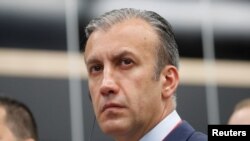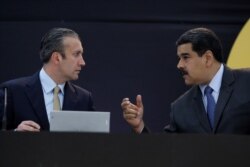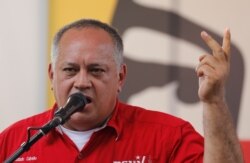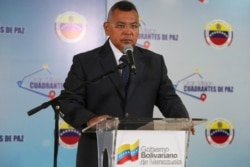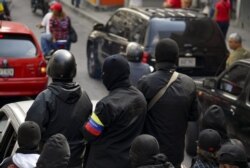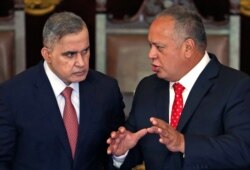Former Venezuelan Vice President Tarek El Aissami last week struck out at Washington after the Trump administration named him, along with Venezuelan businessman Samark Jose Lopez Bello, to its Most Wanted List for international narcotics trafficking and money laundering.
El Aissami was accused of managing a vast narco-trafficking network involving the Venezuelan military, and other members of his family who also hold key government positions. He also has been accused by former Venezuelan spy chiefs who defected recently to have ties with the Iranian-backed movement Hezbollah.
The move followed the 2017 designation of El Aissami, now minister of industry and national production, as a "specially designated narcotics trafficker" by the U.S. Treasury Department.
"I will not surrender to this new attack by U.S. imperialism," he said on Venezuela's state television, "I ask for more power for popular mobilization and national civic movement with our national forces," he added.
President Nicolas Maduro had earlier also defended his "vice president of the economy," saying El Aissami was the victim of "political persecution by the racist and anti-Arab Donald Trump."
El Aissami who is of Syrian origin, has deep ties with Middle Eastern radical movements supporting the Venezuelan administration and receiving proceeds from his drug-trafficking operations, according to Gen. Hugo Carvajal, former director of Venezuela's military counter-intelligence service.
El Assami was interviewed last week on the state television channel by talk show host Diosdado Cabello, who is also head of Maduro's rubber-stamp national assembly and considered a key power broker by senior U.S. diplomats. The envoys have repeatedly contacted him in efforts to negotiate a peaceful exit for Maduro.
Cabello may have had an opportunity to cash in on a multimillion-dollar U.S. reward for information about El Aissami — whom he is rumored to see as a rival — when he met with a top U.S. envoy last month, as reported by the Associated Press. Both Maduro and U.S. President Donald Trump last week confirmed that discussions between high-level representatives of their governments took place in July.
It is not known if they discussed El Aissami, but whatever the internal tensions that U.S. diplomatic analysts say exist within Maduro's administration, turning him in would carry major risks.
Tons of cocaine that the U.S. alleges El Aissami moved to Mexico and the U.S., were flown out of a Venezuelan air force base, say the indictments that cite collusion by Venezuela's top brass. Gen. Nestor Reverol, who is interior minister, was also indicted by U.S. courts in 2016, having replaced El Aissami as Venezuela's security chief in 2012.
Maduro appointed El Aissami vice president in 2017, just before his 2018 presidential election win that was internationally denounced as a fraud and that triggered mass protests in Venezuela.
"Iran and Hezbollah have a solid base of operations in South America in alliance with the narco-dictatorship of Nicolas Maduro," Organization of American States Secretary General Luis Almagro told a June meeting of Latin American governments in Lima, Peru.
"El Aissami is the strategic projection of Hezbollah and Iran in Venezuela and Latin America," according to Juan Marulanda Marin, a former Colombian intelligence officer who has worked in Venezuela as a security consultant for major oil companies.
"Maduro is advised and protected by a multilayered security system of which Hezbollah forms part," he said.
On being named vice president, El Aissami took charge of an interagency task force coordinating the internal security service SEBIN, the military counterintelligence service DGCIM and unofficial paramilitary "Colectivos" modeled on Hezbollah.
Over the years, an El Aissami associate, Lebanese-born Ghazi Nasr al Din has fused Hezbollah militants arriving from the Middle East with locally recruited pro-government thug squads initially called Circulos Bolivarianos, according to detectives of the now-disbanded Caracas Metropolitan police.
An accountant who worked for Nasr al Din told VOA that special teams were formed called Commandos of Loyal Discipline, entrusted with maintaining strict ideological adherence within the Colectivos, which also manage food distribution and social services in districts of Caracas.
Nasr aAl Din even told followers that they should be prepared to kill the president if he betrayed the cause, according to the source.
El Aissami issued thousands of Venezuelan passports to Hezbollah members entering Venezuela when he was interior minister, according to a report by the Washington-based Center for a Secure and Free Society, which conducted interviews with several former officers of the Venezuela's Immigration and Identification service.
Many of the passports were issued through Venezuelan embassies in Lebanon, Syria and Jordan, where Nasr Al Din and El Aissami's cousin Husam held diplomatic postings according to the FBI, which listed Nasr Al Din as a "person of interest" in connection with Hezbollah in 2015.
Another Venezuelan official sanctioned for alleged links with terrorism by the Trump administration, Tarek William Saab, was appointed attorney general when El Aissami became vice president.
Saab has been leading the prosecutions of military officers rounded up by El Aissami's anti-coup command, including navy Lieutenant Commander Alvarez Acosta, who recently died while under interrogation by government agents.
In a meeting last month with the head of the U.N. Commission for Human Rights, Saab denied allegations that a new special police unit has conducted about 7,000 extrajudicial executions.
A Venezuelan police defector has told the Spanish newspaper El Pais that members of the Colectivos have been increasingly brought into the police since 2017, forming the main recruitment base for the unit.




